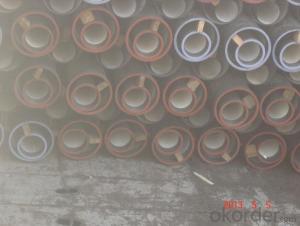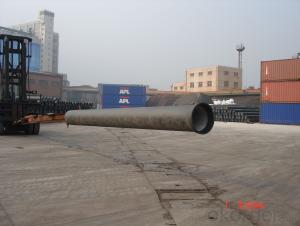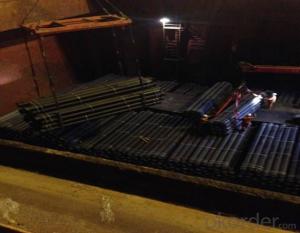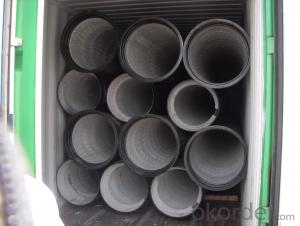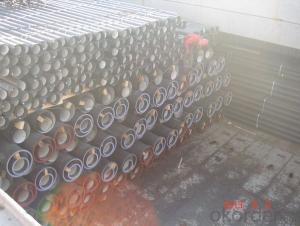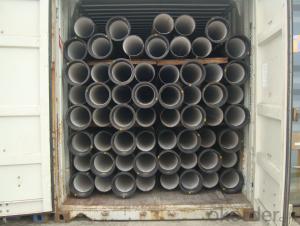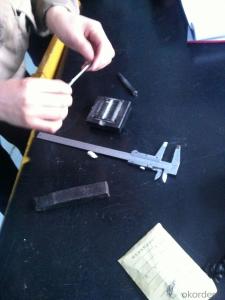DUCTILE IRON PIPES AND PIPE FITTINGS K8CLASS DN200
- Loading Port:
- Tianjin
- Payment Terms:
- TT OR LC
- Min Order Qty:
- 22 pc
- Supply Capability:
- 3000 pc/month
OKorder Service Pledge
OKorder Financial Service
You Might Also Like
Material : Ductile Cast Iron
Size Range : DN 80mm to DN 2000mm
Unit Effective Length : 6m or 5.7m
Manufacture Standard: ISO 2531:1998/ EN 545:2006/EN 598:2007
Annual capacity : 200,000 tons
Coating Exterior: Zinc 130g/m2 according to ISO 8179-1 and bitumen coating 70 microns.
Cement Interior: Portland Cement/ High Alumina Cement/ Sulphate Resisting Cement Lining according to ISO 4179
Special requirements on external coating and internal lining can be applied
We also provide accessories such as SBR/EPDM rubber gaskets, lubricant paste, pipe caps, PE sleeves, etc.
Additional Parts:
Each pipe is strictly inspected according to related standard to ensure permanently high performance.
Easy Installation at site and service free for life
Long Service Lifespan
Quotation will arrive you within 24hours once we get your inquiry.
We guarantee offering you a competitive price.
A copy of original inspection reports of pipes will be offered after shipment.
Photos of loading process will be sent to the customer after shipment effect.
We will follow-up the delivery progress after shipment effect and update to the customer on weekly basis.
- Q: Do ductile iron pipes require internal lining for potable water applications?
- Yes, ductile iron pipes do require internal lining for potable water applications. This is because the iron used in these pipes can react with the water and potentially contaminate it. Internal lining acts as a barrier between the water and the iron, preventing any chemical reactions and ensuring the water remains safe for consumption.
- Q: Are ductile iron pipes resistant to impact damage?
- Ductile iron pipes possess remarkable strength and durability, rendering them resistant to impact damage. Their exceptional toughness and flexibility are a result of their unique composition, which includes a higher percentage of carbon and silicon. Consequently, ductile iron pipes can withstand external forces and impacts, such as those caused by heavy construction equipment or accidental incidents during installation or maintenance activities. Moreover, these pipes exhibit a high resistance to cracking and fracturing, thereby further enhancing their ability to endure impact damage. However, it should be noted that although ductile iron pipes are highly resistant to impact damage, they are not completely immune. Extreme or repeated impacts may still inflict damage, albeit to a lesser extent compared to other pipe types. Regular inspections and maintenance are crucial to detecting and addressing any potential impact damage to ensure the long-term integrity and performance of ductile iron pipes.
- Q: Are ductile iron pipes suitable for installation in areas with high soil compaction and traffic loads?
- Yes, ductile iron pipes are suitable for installation in areas with high soil compaction and traffic loads. Ductile iron pipes have high tensile strength and are highly resistant to external loads, making them ideal for areas with heavy traffic and compacted soil. They are designed to withstand the pressure and stress caused by the movement of heavy vehicles and the weight of the soil above them. Additionally, ductile iron pipes have excellent flexibility, allowing them to absorb and distribute the load more effectively, reducing the risk of damage or failure. Therefore, they are a reliable choice for installation in areas with high soil compaction and traffic loads.
- Q: What is the expected joint restraint method for ductile iron pipes?
- Typically, when it comes to joint restraint methods for ductile iron pipes, the two commonly used options are mechanical joints or push-on joints. Both of these joint types are reliable and prevent leaks, ensuring the stability and integrity of the pipeline system. Mechanical joints involve the use of rubber gaskets and bolts to tightly seal the joints, while push-on joints rely on a groove and rubber gasket system to create a watertight seal. Both methods have excellent joint restraint capabilities and allow for the smooth transmission of fluids or gases through the pipeline without any risk of joint separation or failure. Moreover, these joint restraint methods also make installation and maintenance easier, which is why they are often preferred for ductile iron pipe systems.
- Q: Can ductile iron pipe be used for compressed air systems?
- Yes, ductile iron pipe can be used for compressed air systems. Ductile iron is known for its durability and high strength, making it suitable for handling the pressure requirements of compressed air systems. However, it is important to consider factors such as pipe sizing, pressure ratings, and compatibility with other system components to ensure safe and efficient operation.
- Q: Can ductile iron pipes be used in areas with high temperature variations?
- Yes, ductile iron pipes can be used in areas with high temperature variations. Ductile iron has a high resistance to thermal expansion and contraction, making it suitable for withstanding temperature fluctuations without compromising its structural integrity or performance.
- Q: What are the typical bedding and backfill requirements for ductile iron pipes?
- The typical bedding and backfill requirements for ductile iron pipes involve using a granular material, such as sand or gravel, to provide proper support and cushioning for the pipe. The bedding material should be placed evenly around the entire circumference of the pipe, ensuring that it is in direct contact with the bottom of the pipe and extending to a certain height above it. Backfill material, on the other hand, is used to fill the remaining space around the pipe and should be placed in layers and compacted to prevent settlement. Additionally, proper compaction and compaction equipment should be used to ensure the stability and long-term performance of the ductile iron pipes.
- Q: Can ductile iron pipes be used for geothermal heating and cooling systems?
- Yes, ductile iron pipes can be used for geothermal heating and cooling systems. Ductile iron pipes are known for their strength and durability, making them suitable for underground applications like geothermal systems. They can withstand the high temperatures and pressure variations associated with geothermal heating and cooling, making them a reliable choice for this purpose.
- Q: Can ductile iron pipes be used for underground sewage systems?
- Yes, ductile iron pipes can be used for underground sewage systems. Ductile iron is a type of cast iron that has enhanced flexibility and strength, making it suitable for various applications, including sewage systems. Ductile iron pipes offer several advantages for underground sewage systems. Firstly, they have excellent corrosion resistance, which is crucial in sewage systems where the presence of moisture and chemicals can cause corrosion over time. This resistance to corrosion ensures the long-term durability and reliability of the pipes. Secondly, ductile iron pipes have high tensile strength, allowing them to withstand the pressure and stress that can occur in underground sewage systems. They are resistant to ground movements, such as soil settling or shifting, which can cause damage to other types of pipes. Furthermore, ductile iron pipes have a smooth internal surface, which results in a better flow capacity and reduces the likelihood of clogging or blockages in the sewage system. This smooth surface also helps to minimize the accumulation of debris and sediment, reducing the need for frequent maintenance and cleaning. Another important factor is that ductile iron pipes are available in various sizes and can easily be connected using a range of joint systems, allowing for flexibility in designing and constructing underground sewage systems. In summary, ductile iron pipes are an excellent choice for underground sewage systems due to their corrosion resistance, high tensile strength, smooth internal surface, and ease of installation.
- Q: What is the external coating used in ductile iron pipes?
- The external coating used in ductile iron pipes is typically made of a protective material such as zinc or asphalt. These coatings are applied to the surface of the pipe to provide corrosion resistance and protect the iron from the surrounding environment. Zinc coatings, such as hot-dip galvanizing, are commonly used due to their excellent corrosion resistance properties. Asphalt coatings, on the other hand, provide a durable and flexible barrier against corrosion and abrasion. The choice of coating depends on factors such as the intended application, environmental conditions, and the specific requirements of the project.
Send your message to us
DUCTILE IRON PIPES AND PIPE FITTINGS K8CLASS DN200
- Loading Port:
- Tianjin
- Payment Terms:
- TT OR LC
- Min Order Qty:
- 22 pc
- Supply Capability:
- 3000 pc/month
OKorder Service Pledge
OKorder Financial Service
Similar products
Hot products
Hot Searches
Related keywords
